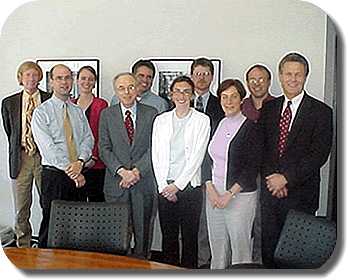E&EM lead professor Jonathan Deason was selected in January 2004 as a Policy Research Scholar for the George Washington Institute of Public Policy (GWIPP). This GWIPP program aims to increase the amount of externally funded policy-related research at the George Washington University. The two research proposals submitted by Dr. Deason were both selected in the 2004-2005 Policy Research Scholar Competition. The Policy Research Scholar position will enable Dr. Deason to pursue external funding for policy-related research.
The picture below shows the group of GWIPP policy research scholars. They come from various departments and have proposed interesting and wide-ranging topics for research:![]() Tonya Dodge (Psychology) - The Gateway Theory: Implications for Public Policy and Steroid Use in Adolescents
Tonya Dodge (Psychology) - The Gateway Theory: Implications for Public Policy and Steroid Use in Adolescents![]() Marty Finnemore (Political Science) - Global Governance by NGOs: Policy Formation and Implementation
Marty Finnemore (Political Science) - Global Governance by NGOs: Policy Formation and Implementation![]() Kimberly Morgan (Political Science) - Tax Policy as Social Policy: The Comparative Politics of Taxation in Advanced Industrialized States
Kimberly Morgan (Political Science) - Tax Policy as Social Policy: The Comparative Politics of Taxation in Advanced Industrialized States![]() Jonathan Deason (Engineering Management & Systems Engineering) - Optimization Model to Improve National Energy Security and Environmental Quality
Jonathan Deason (Engineering Management & Systems Engineering) - Optimization Model to Improve National Energy Security and Environmental Quality![]() Wally Mullin (Economics) - Electricity Market Design and Performance
Wally Mullin (Economics) - Electricity Market Design and Performance![]() Steve Smith (Economics) - Impact of the BRAC Targeting the Ultr-poor Program in Bangladesh: A Rigorous Study of an Innovative and Promising Poverty Program
Steve Smith (Economics) - Impact of the BRAC Targeting the Ultr-poor Program in Bangladesh: A Rigorous Study of an Innovative and Promising Poverty Program![]() Bob Rycroft (Center for International Science & Technology Policy) - Innovation Networks, Knowledge Spillovers, and the Spatial and Temporal Distribution of Technological Change
Bob Rycroft (Center for International Science & Technology Policy) - Innovation Networks, Knowledge Spillovers, and the Spatial and Temporal Distribution of Technological Change![]() Paul Wahlbeck (Political Science) - Institutional Development on the U.S. Supreme Court
Paul Wahlbeck (Political Science) - Institutional Development on the U.S. Supreme Court![]() Jennifer Spencer (International Business) - High Tech Innovation and National Competitiveness: Implications for Public Policy
Jennifer Spencer (International Business) - High Tech Innovation and National Competitiveness: Implications for Public Policy
One of the research projects admitted by the program is entitled Optimization Modeling to Improve National Energy Security and Environmental Quality. This research project has the objective of assisting the federal government in meeting the goals of the Energy Policy Act (EPACT) of 1992 and Executive Order 13149. These rules aim to increase the use of alternative fuels such as methanol, natural gas, and hydrogen, in order to improve national energy security and environmental quality. EPACT and E.O. 13149 have established requirements to reduce petroleum use, including the use of alternative fuel vehicles (AFVs). However, these requirements have generally not been met by the 18 covered agencies, due to constraints such as budget and fuel availability.
Under the proposed research, Dr. Deason and E&EM doctoral students will develop several mathematical optimization programs. These programs will aid federal agencies in complying with EPACT and E.O. 13149 by developing optimal acquisition policies. The model will display real-world constraints. Additionally, the research will identify the required data inputs for a working model and provide policy recommendations on automated data acquisition. Data sources such as the Department of Energy's Federal Automated Statistical Tool (FAST) database and databases from the General Services Administration will be utilized. The model will also be useful in guiding federal fleet managers on making quick calculations based on changing conditions.
Dr. Deason's second research project is entitled Assessment of Environmental Sustainability Trends in Federal and State Parks: Implications for Policy Development. The goal of this research project is to analyze the trends in environmentally sustainable practices at state and national parks, and to utilize the results attained to develop policy recommendations for the National Park Service and state level parks. These recommendations will assist in achieving long-term environmental sustainability at the parks. A research plan and a web-based survey instrument have already been developed as a joint effort with the National Park Service. The research will continue with the utilization of the developed survey for determining the baseline of sustainable operations at the parks and will be followed by conducting progress surveys to evaluate progress over a determined time, based on performance metrics.


